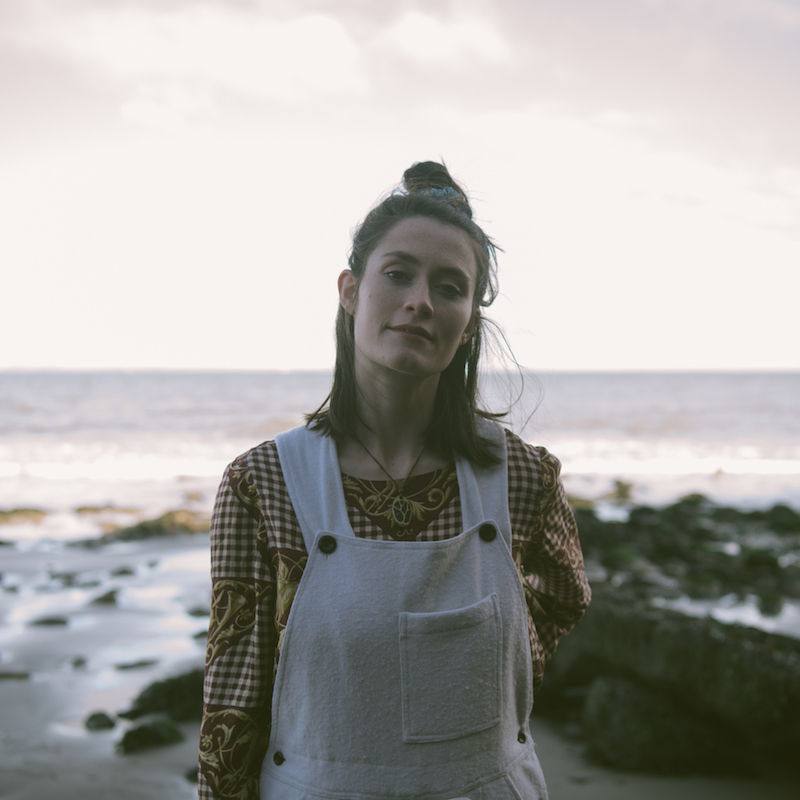
by Lindsay Munroe
Sensuality, sexuality, spirituality, motherhood and song – Rachel Sermanni’s journey to find herself
Rachel Sermanni joins me from her living room, seeming serene, sipping a mug of hot water. Our conversation flits and flows from spirituality, motherhood and writing about womanhood, to Rachel’s favourite dancing soundtracks (Fatoumata Diawara), the poetry of Hollie McNish, and why it’s impossible to get Eternal Flame out of your head once you’ve heard it. Sermanni, long ago, proved herself to be a masterful songwriter and her upcoming EP only cements this further – deftly encapsulating the complexity of life changing experiences with an unmatched empathy and honesty.
The past year has been tumultuous for us all, but for Sermanni it is part of a longer journey of upheaval and navigating new terrain. On her EP, Swallow Me, she charts the beginning of this journey: an unexpected path towards motherhood. ‘I still feel quite vehemently that it’s really important to talk about the darker side to women having babies and the complexities of like… that I wasn’t, you know, some in love, betrothed, married woman with a belly full of giggles and muffin.’ She wonders what her daughter, now three, will think of this EP and interview when she grows up.
Sermanni has always had an impressive propensity to tell a story from all sides – never one to shy away from the shadowy side of an experience. She touches on this as she tells the story of a recent women’s Yoga Nidra group: ‘In our smaller group, there was this older woman… and we were discussing the changes and transitions in a woman’s life – whether that’s the hormonal shifts of the month, or peri-menopause or menopause. And she said, “well, I can relate to everything you have all said, and I’ve been through many tunnels in my life and I can say that I’ve always found a rainbow at the other end.”’ The tracks on this EP are Sermanni’s attempt to surrender to that tunnel of change but, she assures me, ‘I have a full on, full blown colourful rainbow at the other end.’

Written on tour in the US over three years ago, Swallow Me reckons with oncoming motherhood, new love and the place of spirituality in such an uncertain time. ‘I realise that normally I say in order to write the song you have to be out of the situation a wee bit; you have to have clarity. But in the case of this EP, I actually was writing the songs in the heat of the moment.’ Yet before these songs were introduced to the world, Rachel had a full album to release – 2019’s reflective, meditative, So It Turns. ‘I had a proper backlog because I released the last album in Rosa’s first year of life. But I had recorded that maybe three years before. But obviously the whole releasing of a baby became much more of focus.’
Lockdown brought the opportunity to return to these songs; supported by a new manager and Berlin-based producer, Fin Greenall (Fink), who hand-picked this collection of songs from the vaults of Sermanni’s demos. ‘I think my original vision had been that I do a maiden archetype EP, then a mother archetype EP… Basically, it is a kind of mourning maiden in a sense, of coming to terms with those changes. But I think the original idea was too overt and theatrical, then Fink came along with this coolness and said, “I like these songs,” narrowing it down, and it happened to be that these songs were mostly from pregnancy.’
Sermanni’s parts were recorded in her shed, merging via the internet with players in Berlin to create an astoundingly intimate and authentic sound. ‘Fin was cool because he wasn’t precise, so I didn’t have to be precise. So sometimes, if it fell out of click, that was totally fine. I think that actually it creates the band vibe in a sense – there’s not so much cleanliness that it felt sterile, which was my worry. That this could just sound really too clean, and it doesn’t and that’s cool, and I think that’s partly down to me being allowed to be me and be a bit messy.’
Sermanni, with a decade of releases under her belt, has never seemed afraid of messiness and honesty in her song writing. ‘I feel a bit in awe of child Rachel who wrote her songs. They’re very free. I don’t remember what I was listening to… I think I was really into Tim Burton and it was stories that Tim Burton told, but it was also Danny Elfman’s music.’ We hone in on our early influences and find a shared inspiration and passion in Laura Marling. ‘That was the externalisation of my little world, of my little realm of making music being something that people could do – she was a proper doorway goddess who gave access for people our age.’ This was, I suggest, because Marling has often come across as so uncompromising in her career; a woman whose career reached heights far beyond her peers, yet who rarely seemed to care about others’ expectations of what a woman in music ‘should’ be. ‘She was an example of someone who helps people find their own voice because none of us are Laura Marling, and she’s her own magical being. She’s uncompromising in many ways, but she’s also just being who she is and, for me, I’m never going to be an uncompromising Laura Marling. But in the way I perform, I want to be uncompromising in a different way.’
Like Marling, Sermanni has written unapologetically about women’s experiences throughout her career. While the past decade has seen a huge growth in numbers and reach of female artists, we agree that ‘there’s definitely things that are cool to talk about in the realms of being a woman and there are definitely a lot of things that aren’t cool to talk about.’ Motherhood has often fallen in the ‘not cool’ camp. Sermanni mentions the Spilt Milk Gallery in Edinburgh as an example of how work is being done to address the way that art created by mothers is often dismissed. ‘It’s just not given the same worth.’ For Sermanni, however, motherhood brought a new awareness of presenting women’s experiences in song. ‘I see now that I’ve had quite a strong connection with the feminine for a long time. But it was only in having Rosa and feeling very much like ‘this is isolating’ and having these things that I practiced as spiritual practices and means to be who I was, and create how I created taken away. For example, I was a big runner and into full on active, physical yoga, and sitting meditation. And then after Rosa it was like “I don’t have the energy; I don’t want to.” It was through those hardships that I started reading and recognising biological phases in a woman’s life, and learned to support that and came into contact with other women who already knew this.’
As Sermanni’s songs communicate, this journey of understanding doesn’t have a clear ending: most of us go through more than one tunnel and find more than one rainbow. In considering writing and womanhood, she finds herself struck by a new challenge. ‘For me, a struggle has been returning to a sexuality and a sensuality as a mother, God forbid. But the truth is that sexuality and sensuality, what I’ve learnt, is fundamentally linked to creativity. And having done some studying on this, I realise that I may not have been physically sexually active when I was doing loads of making things, but I was like lusty, you know? But there’s this funny thing of like how do I now, as a mother, be in touch with my playful, sexual, sensual side which was so much more easy to be a part of beforehand? So that’s a bit of a journey for me now because I’m writing songs exploring it, asking how does one balance all these funny energies and physical realities.’
A sense of connection and spiritually infuses Sermanni’s work, from her debut, Under Mountains, where she describes the spirituality as ‘very much nature based, but also a bit shy. I think I kind of detest the word spiritual because it makes people roll their eyes and I’ve still not managed to find the right resonant word for it, because there probably isn’t. But especially more recently, I have thought that as a way to demonstrate that there might be something beyond your knowing, just listen to music and try to deny what you’re feeling. Like what they heck, this is just somebody playing a violin.’
It seems that this sense of unknowing and mystery (that we can call spirituality, but don’t roll your eyes) infuses Sermanni’s commitment to exploring the darker elements of our experience and our psyche. ‘The truth is that your logical, pragmatic mind is only a tiny tiny aspect of your brain, or the access of your brain, and it’s only a tiny, tiny aspect of your body. And the science of spirituality is actually very logical. To think that you are some solo individual, bereft of a miracle and that there’s like some sort of cognitive relatable explanation for everything makes no sense at all and is so small. And I think when as musicians, as writers, we are constantly in contact with that. Even if you’re one of these people who thinks they’re very pragmatic or logistical. And that thing of “I don’t know where that came from” but with the addition of “but it felt right.” Long may we hold onto what we don’t know, but that feels right.’
As Sermanni puts this EP out into the world, she looks forward towards a tour. Over the first lockdown, she found a routine: each Tuesday night she would go down to the shed and for an evening connect to listeners through live streaming songs, poems and charming efforts at navigating the new online gig format. ‘There was something really beautiful about it and something akin to busking in that you’re out on your own, and you’re not sure if anybody’s going to be there, and then a bunch of people show up. And a sense of a really nice buzz – a nice, communal sensation that went on.’ She later moved on to a few more high-tech livestreams from empty yoga studios and stately homes, yet the communal sense pervaded; at her last livestream, there were enough eager commenters to crash the system. Nothing compares to a live show though. ‘I am most looking forward to that feeling of warmth and heat and physical proximity. And the physical energetics of a gig is just very different when you’re in a room and you’re vibing off everybody and their faces and movements.’
Rachel Sermanni’s new EP, Swallow Me, comes into the world on 2nd June – followed by a UK tour in November. Tickets can be found on her website.
Lindsay Munroe is a Manchester based songwriter. Check out our thoughts on her critically acclaimed EP, Our Heaviness, here. Lindsay will return to live shows later this year at Gullivers, Manchester (9th Nov) and The Grace, London (12th Nov).
If you’d like to support us by subscribing to our zine, click here – it’s just £6 a year for four copies (inc p&p).





